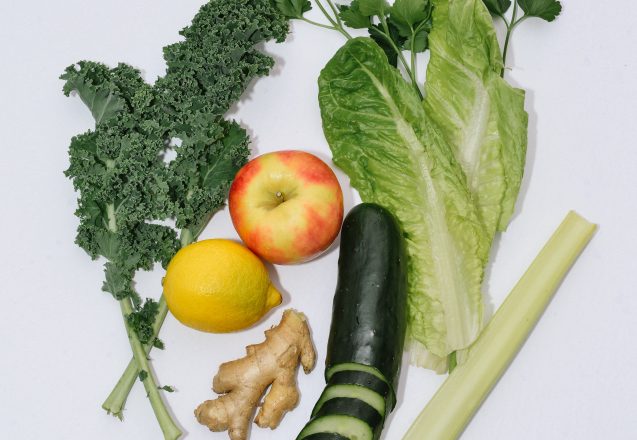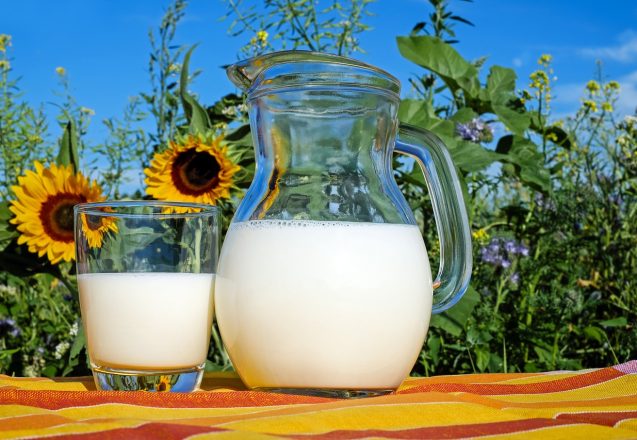Drop The Fries And Move Those Thighs
 If you want to lose weight, you have to eat healthier and move more. For sleek, toned thighs and the flat belly you want, eating healthy and exercising is the answer. It doesn’t mean you’ll never be able to eat fries again, just don’t do it frequently. Instead, focus on healthy food and healthy ways to make that food. You also need to increase your activity. Whether it’s a formal exercise program, walking, biking, or dancing, moving more makes a difference.
If you want to lose weight, you have to eat healthier and move more. For sleek, toned thighs and the flat belly you want, eating healthy and exercising is the answer. It doesn’t mean you’ll never be able to eat fries again, just don’t do it frequently. Instead, focus on healthy food and healthy ways to make that food. You also need to increase your activity. Whether it’s a formal exercise program, walking, biking, or dancing, moving more makes a difference.
Change your diet.
You don’t have to eat a strict diet to shed those extra pounds. Start by making some simple changes. Avoid highly processed food and opt for many fruits and vegetables. Cut out food high in sugar and depend on natural sources of sweetness, such as fruit, for your sugar fix. Cook your food in healthier ways. Steam, broil, boil, or roast food, but don’t fry it. Avoid heavy sauces that contain sugar and fat. Opt for less processed grain. Use brown rice instead of white rice. Choose whole-grain bread instead of white bread. Avoid other foods using white bleached flour.
Start a program of exercise.
You can’t decide where you’re going to lose fat. When you lose weight, it comes off your entire body, not just one spot, no matter how many spot exercises you do. You can tone the thighs or any other part while you burn extra calories to help you shed pounds. Develop a complete workout that includes all types of fitness: aerobics, strength, balance, and flexibility. Make an appointment with yourself to exercise. Do it at the same time every day so it becomes a habit.
Enjoy life.
Increase your activity level by doing fun things. You can tone your whole body when you dance. Riding a bike may be your passion, so plan a short trip to the park. Pack a healthy lunch and make it a family ride. If you find your energy drooping or your stomach growling mid-morning or afternoon, take a healthy snack to satisfy it. You’ll be less likely to eat unhealthy snacks.
- Have a preworkout and post workout snack. It should be high in carbs and protein and contain approximately 100 calories. It helps build muscles and boost recovery.
- As you build muscle tissue, you’ll notice it’s easier to lose weight. Muscle tissue requires more calories to maintain than fat does. The more muscle tissue you have, the higher your metabolism will be.
- Find other ways to increase the calories you burn. Instead of circling the parking lot, trying to find a closer space, park further from the store and walk more. Take the stairs instead of the elevator.
- Don’t try to do it all at once. Cut out sugar first. It takes a few weeks for your body to quit craving it. Then, increase fruits and vegetables in your diet. Increase your activity but take it slowly. When you exercise, focus on form first.
For more information, contact us today at Next Level Fitness



 Our personal trainers in Irvine, CA, focus on making healthy lifestyle changes. Learning to eat right, exercising regularly, and getting adequate sleep are three things that will make a difference in your life and help you live strong. Many of the habits, big or small, decide your future health. If you enjoy walking and take a walk regularly, you’ll have an improved chance of living longer and healthier. There’s a reason certain foods are part of a healthy diet. They keep you healthier.
Our personal trainers in Irvine, CA, focus on making healthy lifestyle changes. Learning to eat right, exercising regularly, and getting adequate sleep are three things that will make a difference in your life and help you live strong. Many of the habits, big or small, decide your future health. If you enjoy walking and take a walk regularly, you’ll have an improved chance of living longer and healthier. There’s a reason certain foods are part of a healthy diet. They keep you healthier.
 If weight loss is your goal and it’s going slow or not happening at all, even though you think you’ve done everything right, you may unwittingly be making diet mistakes that can halt or slow your progress. Some things may be old habits you never thought about much, like that spoonful or two of leftovers you eat instead of throwing away, or the portion size of your meals.
If weight loss is your goal and it’s going slow or not happening at all, even though you think you’ve done everything right, you may unwittingly be making diet mistakes that can halt or slow your progress. Some things may be old habits you never thought about much, like that spoonful or two of leftovers you eat instead of throwing away, or the portion size of your meals.
 It’s hard for idle people to get fit. Most don’t do or enjoy anything that promotes fitness. If sweating in a gym seems unsavory and you don’t believe that healthy food tastes good, you’ve got a long road ahead if your goal is to lose weight, build endurance, or increase strength. There are some things you can do that make getting fit easier and that fit into your lifestyle. These are healthy ways that don’t involve pills or other drastic measures.
It’s hard for idle people to get fit. Most don’t do or enjoy anything that promotes fitness. If sweating in a gym seems unsavory and you don’t believe that healthy food tastes good, you’ve got a long road ahead if your goal is to lose weight, build endurance, or increase strength. There are some things you can do that make getting fit easier and that fit into your lifestyle. These are healthy ways that don’t involve pills or other drastic measures.
 ean? Does it mean you’ll have more endurance? What’s your goal? Is it to lose weight, lower blood glucose, or reduce blood pressure? If it’s weight loss, how much do you want to lose? Be specific about your goal, or you won’t know what route to take or if you reached it. Once a goal is defined, it’s easier to create ways to achieve that goal. Like the red car, you’ll see opportunities everywhere.
ean? Does it mean you’ll have more endurance? What’s your goal? Is it to lose weight, lower blood glucose, or reduce blood pressure? If it’s weight loss, how much do you want to lose? Be specific about your goal, or you won’t know what route to take or if you reached it. Once a goal is defined, it’s easier to create ways to achieve that goal. Like the red car, you’ll see opportunities everywhere.
 You are a unique individual. You may look like your parents or even have an identical twin, but your bodies will be different unless you experience everything the same. If identical twins had different exercise habits, one working out regularly and the other barely getting out of the easy chair, their bodies would reflect that difference. That’s why customized workouts can be so beneficial. They focus on areas that need more help and match your fitness level.
You are a unique individual. You may look like your parents or even have an identical twin, but your bodies will be different unless you experience everything the same. If identical twins had different exercise habits, one working out regularly and the other barely getting out of the easy chair, their bodies would reflect that difference. That’s why customized workouts can be so beneficial. They focus on areas that need more help and match your fitness level.
 Having goals helps give your life definition. They point you in a direction you want to go and help you avoid pitfalls you might otherwise have. Whether it’s a financial or fitness goal, it defines what you want so you can create directions on how to get there. Keeping a goal in front of you can provide inspiration, motivation, and constantly looking for ways to achieve that goal quicker.
Having goals helps give your life definition. They point you in a direction you want to go and help you avoid pitfalls you might otherwise have. Whether it’s a financial or fitness goal, it defines what you want so you can create directions on how to get there. Keeping a goal in front of you can provide inspiration, motivation, and constantly looking for ways to achieve that goal quicker.
 Many people in Irvine, CA, removed dairy from their diet. The reasons vary. For some people, the decision was easy. They either have a dairy allergy or are lactose intolerant. Others may notice they produce less phlegm or have clearer skin when they remove dairy. A small group of people are misinformed and believe dairy is unhealthy. Dairy, like gluten, negatively affects some people, but not all people. Just like going gluten-free, if you aren’t experiencing symptoms when consuming dairy, you may be doing yourself a disservice.
Many people in Irvine, CA, removed dairy from their diet. The reasons vary. For some people, the decision was easy. They either have a dairy allergy or are lactose intolerant. Others may notice they produce less phlegm or have clearer skin when they remove dairy. A small group of people are misinformed and believe dairy is unhealthy. Dairy, like gluten, negatively affects some people, but not all people. Just like going gluten-free, if you aren’t experiencing symptoms when consuming dairy, you may be doing yourself a disservice.
 Bulking up is part of bodybuilding. The three phases include bulking up, cutting, and maintenance. In the bulking phase, you consume more calories than you burn to increase muscle gain. It provides the extra energy to increase muscle size while strength training via eating more calories. The next phase is cutting. You cut the calorie allotment to eliminate excess fat gained during bulking. During that time, bodybuilders aim to maintain their muscles while shedding fat. Soda provides extra calories for the bulking phase, but it’s not necessarily the best source for those extra calories.
Bulking up is part of bodybuilding. The three phases include bulking up, cutting, and maintenance. In the bulking phase, you consume more calories than you burn to increase muscle gain. It provides the extra energy to increase muscle size while strength training via eating more calories. The next phase is cutting. You cut the calorie allotment to eliminate excess fat gained during bulking. During that time, bodybuilders aim to maintain their muscles while shedding fat. Soda provides extra calories for the bulking phase, but it’s not necessarily the best source for those extra calories.
 Whether you’re a stay-at-home mom or dad or just at home with kids occasionally, you don’t have to skip exercising. There are home workouts that address all types of fitness and for all parts of the body that don’t require special equipment. You can even break up the workout into several sessions and do them when you have a short break, including while the kids are napping. Do some with the kids to help them learn a healthier lifestyle.
Whether you’re a stay-at-home mom or dad or just at home with kids occasionally, you don’t have to skip exercising. There are home workouts that address all types of fitness and for all parts of the body that don’t require special equipment. You can even break up the workout into several sessions and do them when you have a short break, including while the kids are napping. Do some with the kids to help them learn a healthier lifestyle.